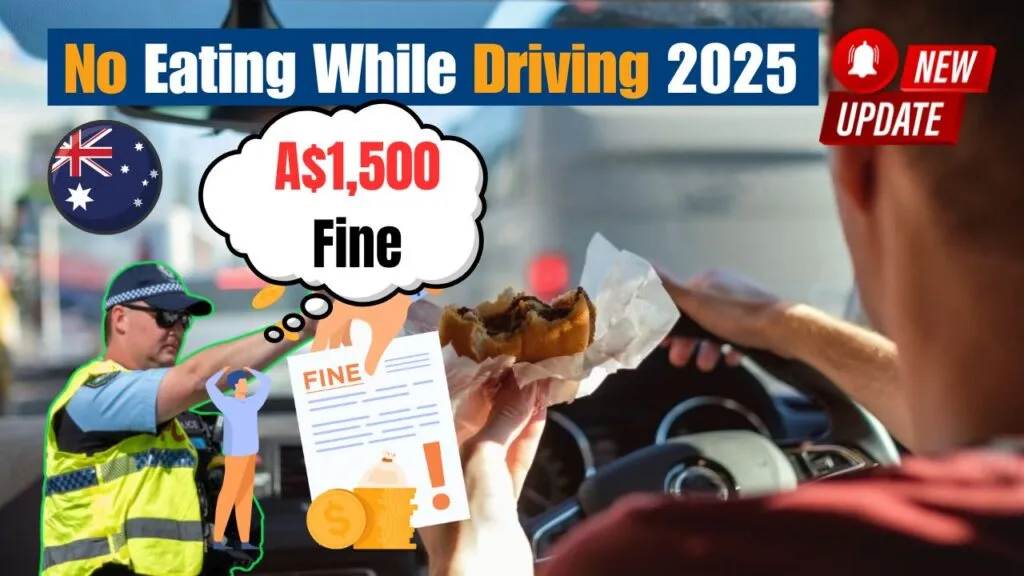Australia’s driving laws have taken a decisive turn towards stricter enforcement with the introduction of the 2025 Road Rule Reform, effective from October 10, 2025. Motorists caught eating, drinking, or vaping while driving can now face penalties reaching up to A$1,500 and multiple demerit points. The reform aims to eliminate minor distractions that often lead to major road accidents, marking one of the country’s toughest crackdowns on inattentive driving.
A Nationwide Push for Safer Roads
Transport authorities across all states and territories have aligned under the National Road Safety Strategy 2025 to address the growing concerns about distracted driving. Although mobile phone restrictions have existed for years, this latest move broadens the scope to include any form of multitasking behind the wheel. The rule stresses the principle that even a second of distraction can be dangerous.
The penalties vary slightly across states, but most follow a tiered fine structure. Drivers eating while driving can be fined between A$800 and A$1,200, those drinking non-alcoholic beverages between A$700 and A$1,000, and vaping or smoking offenders up to A$1,500. Each offence also carries between two and four demerit points, making it a costly mistake for motorists who fail to give full attention to the road.
Why the Crackdown Became Necessary
Australian safety regulators identified a sharp increase in crashes linked to momentary driver inattention. According to government data, taking eyes off the road for just two seconds at 60 km/h covers more than 30 meters of travel — enough to miss traffic signals or hit other vehicles. Authorities believe activities like eating or handling a vape device significantly delay reaction times, contributing to hundreds of preventable accidents annually.
This reform closes a long-standing legal gap where police could only penalize distracted motorists if the act clearly affected vehicle control. Now, the rule explicitly defines eating, drinking, or vaping while operating a vehicle as distracted driving behaviour, allowing officers to issue penalties even if no immediate accident occurs.
AI Cameras and Smart Surveillance
To ensure consistent enforcement, the government has introduced advanced AI-based cameras and sensor technologies capable of detecting driver behaviour automatically. These systems are designed to identify movements such as holding a coffee cup, adjusting a vape pen, or handling food items. Footage captured by these smart cameras is reviewed before any infringement is issued, ensuring accuracy while extending police reach across major urban and highway routes.
Early trials in states like New South Wales and Queensland showed effective detection rates and helped refine the technology before the nationwide rollout. This approach mirrors strategies already in use for mobile phone violation detection.
State Enforcement and Fines
Each state will implement the reform with minor variations, but all will adhere to the federal guideline for penalties and enforcement mechanisms.
- New South Wales: On-the-spot fines, increased roadside patrols, and targeted camera surveillance in metropolitan areas.
- Queensland: Mandatory demerit addition for distracted driving offences under the new rule.
- Victoria: Licence suspensions for repeated infringements within a 12-month period.
Authorities have also emphasized education, launching awareness campaigns to inform drivers about the dangers of multitasking behind the wheel and the financial consequences of violations.
Vaping Behind the Wheel Now a Defined Offence
Under the amended traffic laws, vaping has officially joined the list of high-risk distracted driving behaviours. Police can now fine drivers for holding or inhaling from a vape even when vehicles are stationary at red lights or in congested traffic. The move responds to an observed rise in vaping incidents, which authorities found equally distracting as mobile phone use.
Public feedback during consultation highlighted mixed opinions, but safety experts supported the inclusion of vaping, citing it as another device that requires hand-eye coordination and diverts attention from driving tasks.
Broader Impact of the 2025 Road Safety Reform
The tighter regulations form part of a national effort to align with international safety standards practiced in Europe and select states in the U.S. By focusing on behavioural factors, the government aims to reduce annual road fatalities by at least 30 percent by 2030. Official data estimates that human error plays a role in over 80 percent of road crashes, making distraction management a crucial target for reform.
The legislation also serves a preventive purpose rather than a punitive one. While fines are steep, the ultimate goal is to encourage behavioural change and consistent driver awareness. Officials expect that as awareness grows, compliance will improve and penalty revenue will decline — a sign of success for the program.
What Australian Drivers Should Know
From October 10, 2025, road policing will extend beyond mobile phone enforcement. Any act that shifts focus from driving — eating breakfast sandwiches, handling beverage bottles, or vaping at traffic lights — may result in fines or demerit points. Drivers should complete all such activities before starting the engine or after parking safely.
The table below summarises the new penalties:
| Offence Type | Penalty (AUD) | Demerit Points | Effective Date |
|---|---|---|---|
| Eating while driving | $800–$1,200 | 3 | Oct 10, 2025 |
| Drinking (non-alcoholic) | $700–$1,000 | 2 | Oct 10, 2025 |
| Vaping or smoking | Up to $1,500 | 4 | Oct 10, 2025 |
| Using mobile phone | $1,600–$2,000 | 5 | Already in effect |
As the new rule takes hold, motorists are urged to adapt quickly to avoid unnecessary penalties and contribute to safer Australian roads. The message from transport authorities is clear: full attention saves lives, distractions cost them.
